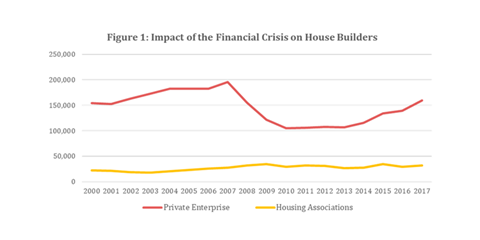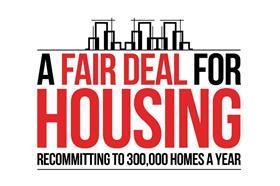Unlike in the past, registered providers may not be able to carry on building as the rest of the market slows down, Geeta Nanda warns
Geeta Nanda has warned that housing associations may not be able to fulfil their historic role of continuing to build homes even as the market halts in a recession.

The chief executive of Metropolitan Thames Valley, speaking at an event in London yesterday, warned that this time around associations may struggle to deliver.
Nanda, who also chairs the G15 group of associations, said: “There have always been times when the market dips, where we have actually increased the supply of rented homes.
“In my heart of hearts, I’m not sure whether there is going to be the ability to do that [this time], the capacity to do that, the will to do that or the money or resources to do that.”
Housing associations, because of their ability to access government grant and reliance on government-backed rental incomes, have traditionally been seen as ‘counter-cyclical’, meaning they are insulated from market forces to an extent. In the 2008 financial crisis, housing association development remained constant and even increased slightly, while activity from private housebuilders fell sharply. (see graph below)
However, Nanda warns that considerable uncertainty around the economy and policy means it is “difficult to have confidence” currently.
The comments come days after fellow G15 boss, Optivo chief executive Paul Hackett told Housing Today his association has put all of its uncontracted development schemes in its pipeline on hold due to concerns about changes in borrowing rates affecting viability of schemes.
Even before the market turmoil in the wake of the mini-budget, concerns were being raised about the impact of inflation on the £11.5bn affordable homes programme as build costs rise but grant in the programme remains the same. The Department for Levelling Up, Housing and Communities has itself warned soaring inflation is a “major risk” to the flagship scheme.

Housing associations are also facing a potential real terms cut to their rental income. The government is proposing limiting next year’s rent increase to 5% to help tenants with cost of living, rather than allowing it to rise in line with inflation.
The G15 has warned of this could lead to “signficant reductions” in spend on development and cuts to building safety, maintenance and decarbonisation work. It estimates it would hit the income of the largest housing associations in London by a total of £3.5bn over 10 years.
See also>> What are housebuilding’s prospects in the wake of the mini-budget?
See also>> How do we boost housing association development?
The G15 also today published a report, with Savills, highlighting its members are forecast to spend £4bn on building safety by 2036 and that it would require spending of £35bn bring all housing association properties up to EPC Band C by 2030 and to replace gas heating by 2050.
The report calls for increased long-term grant funding for associations to help them provide “the ‘counter-cyclical boost’ housing associations can provide in difficult economic times.” It argues a package of support could allow associations to increase annual housebuilding from their five-year average of 43,000 homes a year to 60,000.
A Fair Deal for Housing campaign

Housing Today believes the government should not back away from its manifesto pledge of building 300,000 new homes a year by the middle of the decade. We badly need more homes and a lack of supply is a major factor in creating problems of affordability for both buyers and renters.
Over the next few months, Housing Today will be exploring potential solutions to help us ramp up housebuilding to 300,000. These are likely to, include different ways of working, funding asks of government and policy ideas that could boost housebuilding.
We want to hear from you: what do you think can make a difference at a policy level?
What can the industry do better?
We believe that, with the right commitments from ministers and the industry, it is possible to build more homes and help the government to meet its objectives to “build beautiful”, improve quality and safety, boost home ownership and level up the UK.
Click here to find out more about the campaign
To contribute ideas to our A Fair Deal for Housing Ideas Zone database, click here.











No comments yet